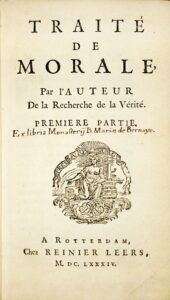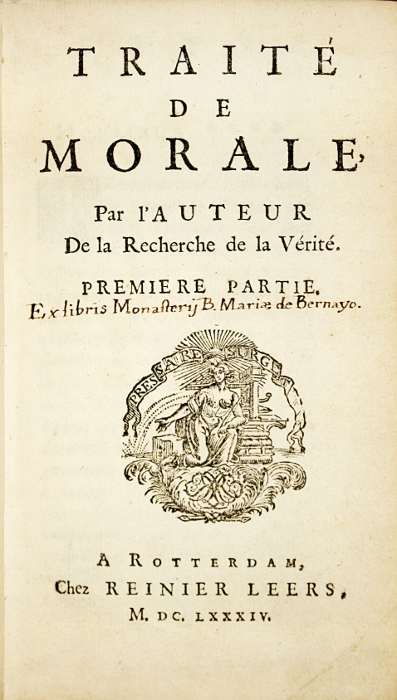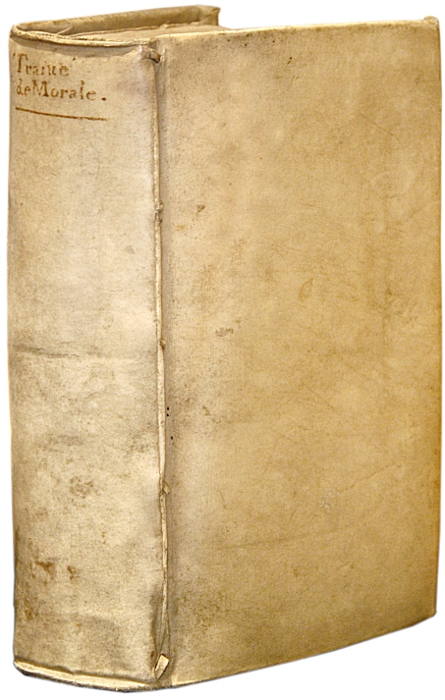Rotterdam, Reinier Leers, 1684.
Two parts bound in one 12mo volume [155 x 91 mm] of: (5) ll., 237 pp., (1) bl.l., 218 pp., (3) ll. of table. Bound in full contemporary overlapping ivory vellum, flat spine with title in ink. Contemporary binding.
First edition of this major treatise of the philosopher Nicolas Malebranche in which he expounds his theory on ethics. Brunet, III, 1336; Barbier, Dictionnaire des ouvrages anonymes, IV, 772.
Another edition of the Treatise on Ethics, bearing the fictive date of 1683, is mentioned in some bibliographies, but it is actually a counterfeit of our edition.
“Written in 1683, probably following his friends’ pleas, the ‘Treatise on Ethics’ was finished towards October of the same year. The edition published at the address of Cologne seems to be a counterfeit of the 1st edition, according to J. Lelong, ‘Mémoire pour la vie de Malebranche’. It is said to be from Rouen.” (A. Sauvy, Livres saisis à Paris entre 1678 et 1701, p. 85).
Malebranche bases ethics on the idea of order, and in this treatise, the love for order appears as the source of all virtues.
“The first [part], about “Virtue”, sets essential virtue as a fundament of ethics: “the usual and dominant love of immutable order”. Order is the hierarchy of the Being, the law that God himself follows in executing his plans. The qualities of the mind required to acquire virtue are: strength that commands us to be attentive to the truth and prevents us from being distracted from the commendable work of the intellect, and freedom that allows us to stay away from finished goods to look at only the Infinite itself. Malebranche considers then the occasional causes of good feelings, without which we couldn’t acquire the love for order, then the occasional causes of certain feelings contrary to the grace, and which reduce its effect, in order to allow to better avoid them. The second part, closely linked to the first one, deals with “Duties”. These are dependent from the object of obligation: those towards God and his attributes, power, wisdom and love, come first. The rule to properly satisfy them is to conform to law, structure and divine actions, to follow the very reasons of Trinity. Then we go to the duties towards the human society, of which we should only consider the eternal destiny of the members. The book ends on the consideration of the duties we have towards ourselves; these one are to work for our own improvement and happiness. Stemmed from the Cartesian rationalism, Malebranche’s ethics takes up the duality science-virtue, to adapt it into the total vision of the transcendental truth, by orientating all the human demands towards their eternal ending. The work highlights the most authentic aspect of Malebranche’s intellectualism: the obedience to law and the love of order meant as a tribute to reason […] Bodies are made for the spirits, to serve them or to put them to the test for superior goods; spirits are made for God, present life for the future one; the temporal society for the eternal one that will follow. The order requires that current interests be subordinated and often sacrificed to those of the future life. […] The order of ethics rests on a steadiness of the being, on a clarity of reason, which make the first and most authentic value.” (Dictionnaire des œuvres, VI, p. 486).
After having studied theology at La Sorbonne for three years, Nicolas Malebranche (1638-1715) enters the Oratory in 1660 and from then on dedicates himself to philosophy. Heir to both Descartes and Saint Augustine, he will be distinguished by the publication of his first work in 1674, The Search after Truth. In conflict with many authors and philosophers of his time, including Antoine Arnauld, Louis de la Ville, or even Bossuet, Malebranche will however receive the support of great personalities of his time; among them the Prince de Condé and the Princess Palatine.
“While the F. Malebranche was composing in Raroy his ‘Treatise on Ethics’, it seems that God wanted to encourage him with a noticeable mark of his protection, as, in the same time as M. de Meaux and M. Arnauld were causing him so much enemies with the authority they had acquired in the world, he was comforted to find, without having searched for it, a significant support. M. le prince, le grand Condé, who was a real genius and also a hero in matters of science as wars.” (La vie du R. P. Malebranche, p. 107).
Considered by Pierre Bayle as “the first philosopher of the century”, Malebranche was received honorary member of the Royal Academy of Sciences in 1699.
This Treatise was blacklisted by the Catholic Church in 1690.
A beautiful and very pure copy preserved in its contemporary overlapping vellum binding.
Provenance: Handwritten ex-libris from the “Monasterii B. Mariӕ de Bernayo.”


